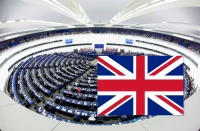It was mid-April when leading European and British news agencies broke loose on stories about the improvement of the UK’s economic prospects. “The economy is set to turn around,” “recession is expected but only a mild one,” “consumer spending is recovering,” “March data show high business activity.” In addition, during one of the business conferences held in London at the end of April, R. Sunak outlined plans to develop the innovation sector in the country. This is breathtaking!
So what’s the forecast? Does the future look bright for the UK? Not at all. The tension is rising very fast. The number of accumulated structural imbalances is too high. The anemic economic growth over the past two years has not been able to eliminate rising risks.
Let’s use the statistics. Food inflation hit a 45-year high of 19% in March. Food prices are rising. The housing sector shows a similar situation. Since 2022, rental prices have increased by an average of 9.5% per year. What about the mortgage market? It’s all bad too. Those who raise a loan at a 1% interest rate in 2020–2021 will soon face the need to refinance it at a 5% rate.

This means that monthly payments will skyrocket immediately at least by 60–70%. Currently, more than 20% of the income of the British goes to mortgage payments. Just add the repayment of consumer loans, the payment of utility bills, rampant inflation, taxes — and the picture will turn to even darker colors: a significant part of the population will simply fail to make ends meet.
In theory, the UK authorities would have long ago taken targeted measures to save the economy and their citizens. But this is the theory. In practice, everything is too bad. Rishi Sunak’s cabinet demonstrates phenomenal incompetence, apparently trying to wish the problems away. Do you really think that the government team includes professionals with considerable experience in managing the economy? Far from it, in fact. For example, Treasury Chief is a former English teacher in Japan. His only relationship with the economy was a few unsuccessful attempts to set up his own business in his youth, including exporting jam to Japan. This “professional” now manages the entire public finance system. While ordinary Brits are trying to scrape together money to pay off a loan, Mr. Hunt continues the streak by insisting on removing the cap on fabulous bankers’ bonuses.
Well, besides Hunt, other officials can fix the stalled economy. For example, guys from the Bank of England.
Alas, no. The Royal banking regulator is only capable of copying the U.S. Federal Reserve. Americans raise interest rates. So do the British. Americans let the “money printer” go brrr. The British are just as good. But unlike the UK, the United States GDP is growing, while inflation is slowing down. Prices are growing even more, loan arrears are increasing, the population is getting poorer.
What does the Bank of England offer? Absolutely nothing. At the end of April, Huw Pill, Bank of England’s Chief Economist, said that households and businesses need to accept they are poorer. The official blamed inflation on businesses that raise prices and try to somehow support employees by increasing their salaries. This is stated by another state “professional” who earns £190,000 a year and lives in a house worth £1.5 million. The reality is that over the past 1.5–2 years, the Bank of England has done nothing to stop the growing financial threats. One might wonder what Mr. Pill will say when the entire banking sector soon staggers under the pressure of large losses caused by mass bankruptcies of customers, deposit outflows, and mounting waves of increases in arrears. According to the Q1 report of Barclays, the UK’s largest bank, the bank’s bad credit card loan provision soared to £524 million from £140 million a year earlier. People see telltale signs spurring anxiety appear everywhere already.
No matter how bad the situation is Rishi Sunak’s cabinet remains calm. There is no debate in the Parliament about poverty; there is no talk about developing a strategy to save the economy. Only unbridled attempts to conclude profitable trade agreements with other countries. Fabulous spending on Australian submarines. Incredible financial aid to Ukraine Fantastic costs of financing numerous overseas bases, including Cyprus, Gibraltar, and the Falkland Islands. After all, it is so important to convince the whole world of the invincible power of the Crown, its ability to govern the whole world and spread its truly democratic values. This resembles a desperate attempt a person suffering from dystrophy takes to run a 50-kilometer marathon — despite all organs failing, the runner refuses hospitalization, still entertaining the desire to get a gold medal. After all, national pride is so important even at the cost of the well-being of the entire British nation.














Comments